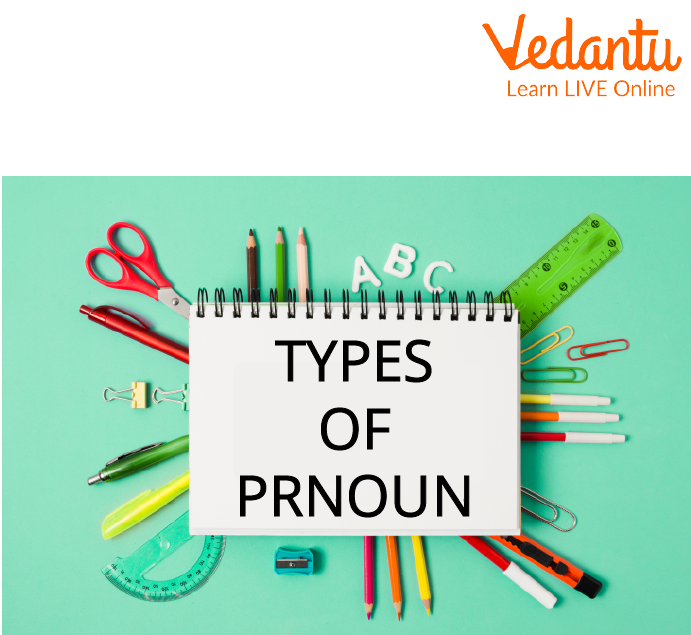Learn and Download: Pronoun and Its Kinds Explained for Class 5 CBSE 2025-26
FAQs on Class 5 CBSE English Grammar: Guide to Pronouns and Their Types
1. What are the most important types of pronouns that Class 5 students must know for the 2025-26 exams?
For the Class 5 CBSE English exams, it is important to focus on the five main types of pronouns. Mastering these is crucial for scoring well. They are:
Personal Pronouns (e.g., I, you, he, she, it, we, they)
Possessive Pronouns (e.g., mine, yours, his, hers, ours, theirs)
Demonstrative Pronouns (e.g., this, that, these, those)
Interrogative Pronouns (e.g., who, what, which, whose)
Reflexive Pronouns (e.g., myself, yourself, himself, herself)
2. What is a common mistake students make between possessive adjectives (my, your) and possessive pronouns (mine, yours), and how can it be avoided in exams?
A frequent error that can cost marks is using a possessive pronoun before a noun. To avoid this, remember this simple rule: Possessive adjectives like 'my', 'your', 'her' always come before a noun (e.g., 'This is my book.'). In contrast, possessive pronouns like 'mine', 'yours', 'hers' are used to replace the noun and stand alone (e.g., 'This book is mine.'). Never write 'This is mine book' in an exam.
3. How are questions on personal pronouns typically framed in Class 5 important questions?
In exams, questions on personal pronouns often appear in two formats: 'fill in the blanks' and 'replace the underlined noun'. For example, an important question might be:
Fill in the blank: 'Ravi is a good boy. ____ always respects his elders.' (The correct pronoun is He).
Replace the noun: 'The teacher gave the prize to Sita.' (The correct sentence is 'The teacher gave the prize to her.').
4. Why is choosing the correct subject pronoun (e.g., 'we') versus an object pronoun (e.g., 'us') important for scoring full marks?
Using the correct form of a pronoun is a key skill examiners check. A subject pronoun (I, we, they, he, she) is the one doing the action and usually comes at the beginning of the sentence (e.g., 'We won the match.'). An object pronoun (me, us, them, him, her) receives the action (e.g., 'The coach congratulated us.'). Mixing them up (e.g., 'Us won the match.') is a grammatical error that will lead to a loss of marks in sentence correction or formation questions.
5. What is an expected question format for demonstrative pronouns in the Class 5 English paper?
A common and important question for demonstrative pronouns tests whether you can correctly identify objects based on distance (near/far) and number (singular/plural). You might be asked to choose the right pronoun in a sentence like: '_____ are my crayons right here, and _____ is your pencil over there.' The correct answer would be 'These are my crayons right here, and that is your pencil over there.'
6. How can understanding reflexive pronouns like 'myself' and 'themselves' help you write better answers in an exam?
Reflexive pronouns are important because they add emphasis, showing that the subject performed an action on its own. For example, 'The students organised the event' is a simple statement. But 'The students organised the event themselves' is stronger and more precise. Using them correctly in sentence-building exercises shows a deeper understanding of grammar, which can earn you higher marks by making your answers more impactful and clear.
7. What is the key to answering questions about interrogative pronouns correctly?
The key is to understand what each interrogative pronoun is used for. This is a frequently tested concept. Remember:
Who and Whom are used for people.
What is used for things or ideas.
Which is used when there is a choice.
Whose is used to ask about ownership.
Matching the right pronoun to the question's context is essential for scoring marks.
8. Why is it important for Class 5 students to identify the pronoun and its type in a given sentence?
This is a very common and important question type in exams. Being able to identify a pronoun (e.g., 'her') and name its type (e.g., 'Personal Pronoun') shows the examiner that you have a solid understanding of grammar fundamentals as per the CBSE syllabus. It tests your basic knowledge and is often a direct, mark-scoring question that forms the foundation for more complex sentence-based tasks.


























